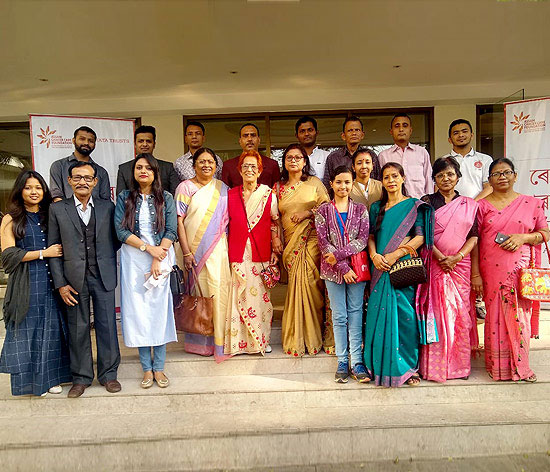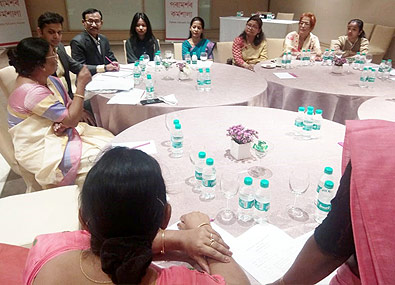
“Cancer seems like a big problem but it really isn’t if we decide to fight it together. What is important is to help the cancer patients through their journey,” says Vandita Sharma, a cancer survivor. Vandita is a participant of the Patient Advisory Group (PAG) set up by the Tata Trusts' Cancer Care programme in Assam.
Initiating the big fight
Tata Trusts have been a pioneer in the field of cancer care since the 1940s, engaged in education and research in oncology to improve treatment modalities and provide access to affordable methods of treatment. Over time, to reduce cancer-related mortality, the Trusts shifted their focus to preventive programmes for early detection and treatment. Now, an ambitious programme of the Trusts, the Tata Trusts' Cancer Care programme, is looking at improving the quality of life for patients and caregivers by creating and providing affordable, accessible and high-quality cancer care across India.
To enable maximum impact the Trusts are concentrating their efforts in Assam. The state reports more than 30,000 cases of cancer annually, 70 percent of which are reported in advanced stages, which is above the national average. The Trusts formed the Assam Cancer Care Foundation in partnership with the Government of Assam in December 2017 to create a sustainable solution to tackle the disease. The programme is being replicated and adapted in other states of the country to widen the reach of patient care and treatment.

An ear to the ground
Patients are at the heart of the Tata Trusts' Cancer Care programme. To embed patient-centricity across the programme, the Trusts decided to raise the bar and in October 2018 set up India’s very first PAG in Assam, modeled on the award-winning Patient Reference Group of King’s College, UK. Members of the Patient Reference Group were actively involved in planning the new cancer centre at Guy’s Hospital, right from choosing the architects and types of chairs to the location of the new chemotherapy suite. Listening and learning from patient feedback resulted in a centre that is calm, uplifting and well-planned, and ensured that the facilities were fit for the purpose designed.
The group members for the PAG in Assam were identified from Dr B Borooah Cancer Institute and State Cancer Institute, as well as local NGOs such as the Deepsikha Foundation, based on recommendations and who would be willing to participate. To make it operational in Guwahati, 15 members were selected on the basis of an assessment criteria developed by the cancer care team. The support and expertise of local partners has been invaluable.
Unlike traditional patient support groups, the aim of the PAG is to get direct advice, feedback and inputs from patients, survivors and caregivers on all aspects of the patient journey — from awareness, screening, diagnosis, treatment, palliative care, affordability and life after treatment. These valuable inputs will allow the programme team to bring about tangible differences for the patient.
Mrimoyee Borooah from Deepsikha Foundation, says, “I believe that PAG is very essential. It is the voice of the patients and a representation of the journey that they have gone through. We need patients’ advice to gauge the difficulties they have faced, what they want and how we can improve their lives.”
The group aims to:
- Be the voice of patients, families and carers.
- Increase the involvement of patients, families and carers in supporting the Trusts and partners to drive continuous improvement in the delivery and development of treatment.
- Address issues concerning awareness, diagnosis, timely treatment, life after treatment, palliative care and affordability.
Feedback from the initial sessions has been overwhelming as demonstrated by 11-year old Vandita, a survivor of metastatic bone cancer who has been going for regular check-ups since her diagnosis in 2012. “I have learnt a lot from the doctors and survivors here and I am grateful to be a part of the PAG.”
The way forward
After the initial sessions, inputs have been received on various aspects of treatment, diagnosis and care. Some immediate areas of focus include counselling families and patients, providing compassionate care, prescribing suitable diets, developing a simplified guidelines booklet for those diagnosed with cancer, and creating awareness about financial help available for cancer treatment.
The group is enthusiastic about taking the message of screening and early detection to the semi-urban and rural areas of Assam. They are keen to provide support to programmes being conducted locally.
To make the PAG more effective and responsive, the Trusts have invited Diana Crawshaw, Chair of the Patient Reference Group at Kings College, London, to share insights and best practices. The learning will be invaluable to the new venture. Further, the current PAG is the first of many, as the Trusts believe that only by truly listening to those who have experienced cancer directly or indirectly can effective and holistic solutions treatment be provided.
